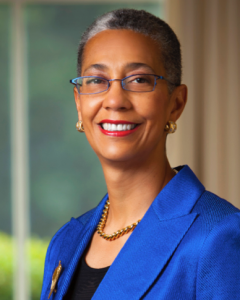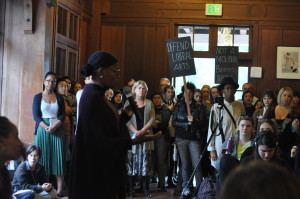
Is Mills in a financial crisis? What exactly is the Dec. 1 deadline? Will historical programs at Mills like book art be eliminated? Those are just some of the questions floating around the campus and the larger community since the release of a memo from President Alecia DeCoudreaux on Oct. 19, outlining a proposal to change the curriculum at the College in order for the College to “Transform Mills’ Curriculum for the 21st Century.”
On Nov. 17, The Campanil sat down with Sabrina Zirkel, professor of educational leadership and chair of the Faculty Executive Committee (FEC), Mills College President Alecia DeCoudreaux, Board of Trustees chair Kathleen Burke and Interim Provost Sharon Washington to address some of these questions.
Is Mills in a financial crisis?
According to Zirkel, President DeCoudreaux and Burke, Mills College is not in a financial crisis.
“The college is in a strong financial place, meaning that we have a large endowment for our size, we have a lot going for us, we don’t have a lot of debt,” Zirkel said. “Its not a budget emergency, its more of an inflection point.”
It was also mentioned that because of Mills’ social justice mission statement, and the fact that many students are on financial aid, it can be hard to generate revenue for the College. However, the administration and faculty have been working on ways to increase revenue.
“There is so much focus on the negative and I hope we can help students and the broader community see that there is an incredible amount of work underway to develop new programs like this, to diversify our revenue, which is something that is very very important — to look for new streams of revenue.” DeCoudreaux said.
What were/are the Nov. 20 and Dec. 1 meetings for?
The board meeting that will take place on Nov. 20 will be where the revised proposals for changes to the curriculum and budget are presented to the Board of Trustee. The Board will provide feedback to the administration and the FEC and from there a draft of the College’s budget for financial year 2017 (FY17) will be drafted. The meeting on Dec. 1 is when the Board will look at and vote on aspects of a proposed budget for FY17.
“The Board is not expecting [a full] budget but a plan to have a better understanding of the work that’s been underway,” Burke said.
This is different from the usual process because typically the budget for the next financial year is largely put together during the spring. Because of the plan to pull less money out of Mills’ endowment, the financial plan and budget must be updated sooner rather than later so the operating budget for the rest of this financial year can be adjusted accordingly.
According to DeCoudreaux, some announcements will be made to the College after this Dec. 1 meeting. But she would like to remind students that everything being worked on is part of a larger process in accordance with the 2013-2018 Strategic Plan for the College. More changes will be announced further down the line.
Are counter proposals being looked at? What do they look like?
In response to the proposed plan for changes to the curriculum, the FEC has put together a counter proposal suggesting cuts across campus in academic settings instead of cutting just departments. Besides cuts, the FEC is suggesting changes being made to existing programs to make them more streamlined and change guidelines for majors in order to make them more accessible to students.
The FEC is also proposing a number of new majors, minors and graduate programs to be offered starting next spring and they would likely be finish and rolled out spring or fall of 2017. Some of these include a master’s in applied economics, and new majors in data science and global thought and literature. The faculty’s slideshow from the presentation can be found here.
This plan was presented to the Board of Trustees on Nov. 13. This meeting was originally open to students from the programs that were being proposed to be cut. However, students were uninvited the night prior; the email to one of the students said it was because of a “miscommunication.”
President DeCoudreaux and Provost Washington note that they are very thankful and welcoming of the feedback that has been pouring in since the Oct. 19 email.
“I want students to bring questions forward,” Washington said.
The Campanil will be continuing their coverage of the curriculum and budget changes throughout the rest of the semester.





